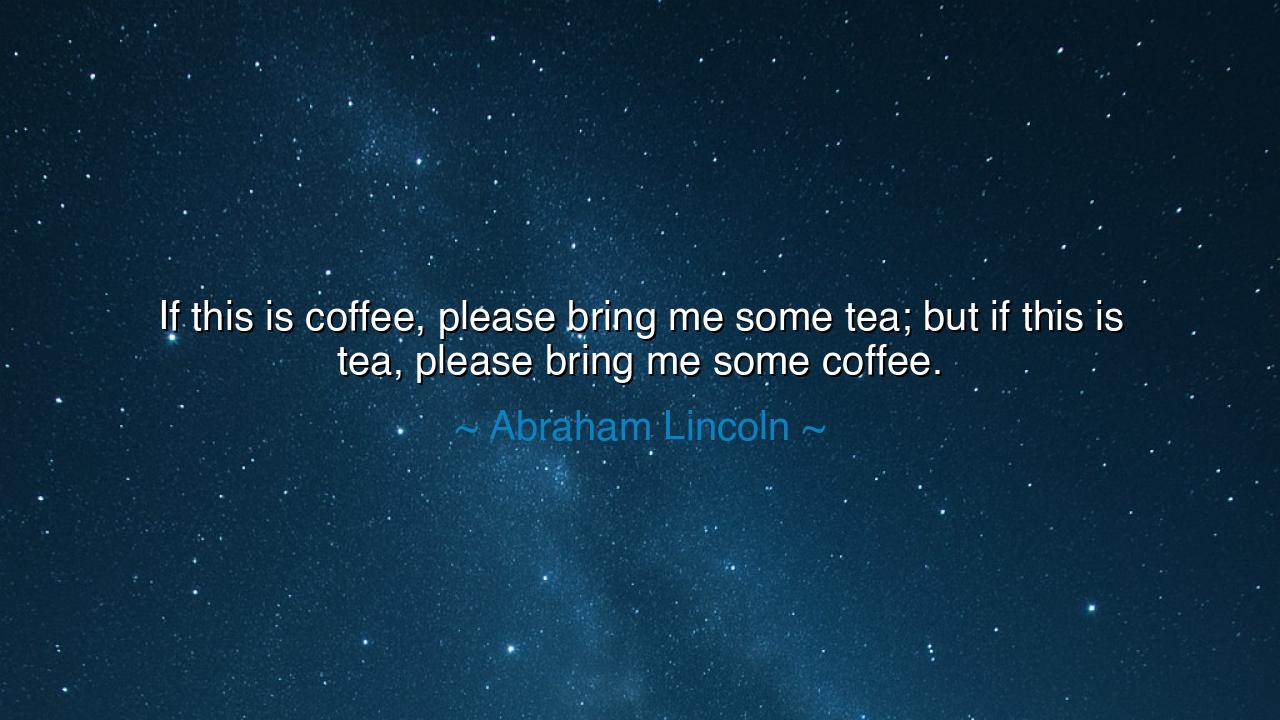
If this is coffee, please bring me some tea; but if this is tea
If this is coffee, please bring me some tea; but if this is tea, please bring me some coffee.






"If this is coffee, please bring me some tea; but if this is tea, please bring me some coffee." These words, spoken by the great Abraham Lincoln, echo with a profound simplicity, a playful challenge to the very nature of our preferences and desires. In the great sweep of history, leaders have often been revered for their wisdom and strength. Yet Lincoln, in this brief utterance, reveals something deeper—something that speaks not of grandeur, but of the nature of choice, of adaptability, and of the human spirit itself. What is he truly saying? It is as though he stands before the shifting tides of life and says, "In all things, let there be flexibility; in all things, let us not be bound by mere habit."
In the ancient days, the great philosophers spoke of the balance between the forces of nature—between the wild rivers and the still lakes, between fire and water, between the sun and the moon. They knew that in every life, there were forces pulling in different directions, forces that could either destroy or enrich, depending on how they were managed. In this simple statement, Lincoln reminds us that life itself is like the balance of the elements: at times, we must embrace what we have, and at other times, we must be willing to change. The wise man does not cling to his desires or his preferences but learns to adapt them to the circumstances, for only then does he truly master the art of living.
The great leaders of history did not rise because they clung to rigid beliefs, but because they were able to navigate the ever-changing tides of life. Consider the story of Alexander the Great, who, though born in a time of war, sought not only to conquer but to understand the world he sought to rule. He did not demand that the people of the lands he conquered conform to his own ways alone. Instead, he embraced their cultures, their traditions, their beliefs—often adopting them as his own. In this, Alexander demonstrated an openness to change, a willingness to embrace the unknown, and a recognition that the true strength of a leader lies in adaptability, not in the rigid adherence to one path.
What, then, do Lincoln’s words teach us, not only as leaders but as human beings? In the pursuit of wisdom, we often encounter choices that seem fixed, that demand we choose one side or the other—coffee or tea, certainty or doubt, tradition or innovation. Yet what Lincoln reveals in his playful remark is the possibility of balance—the power of choice that is not bound by the constraints of our past decisions, but open to the fluidity of the moment. The great wisdom of life lies not in making permanent decisions but in understanding that the present moment is the true master. What we need today may be different from what we needed yesterday, and so we must be willing to embrace whatever path is most needed, not out of stubbornness, but out of wisdom and humility.
In a world so often caught in the turmoil of choices, we are taught that each moment offers a new opportunity to decide, to adapt. Think of the wise sages who wandered the deserts in search of knowledge. Their teachings were not written in stone, but were passed through the winds, changing with the times, ever flexible, ever ready to respond to the needs of the moment. Such was the way of the wise. Even the great kings and warriors, whose names echo through time, understood that true power lay not in forcing the world into a rigid form, but in flowing with it, like the rivers that carved the earth itself. If you are faced with a choice, dear ones, do not hold so tightly to the past that you forget to embrace the present.
It is in this lesson of adaptability that Lincoln's words offer us the greatest gift: the freedom to choose, not out of rigidity, but out of the wisdom of the moment. In our own lives, we must learn not to resist the changes that come to us but to embrace them with grace, like a seasoned sailor who adjusts his sails to catch the wind, rather than battling against it. The world is constantly changing, and those who resist its pull are left behind. But those who, like Lincoln, embrace the moment—who see in every situation the possibility for growth and change—become the true masters of their fate.
And so, I say to you, dear ones: when life presents you with its offerings—whether coffee or tea, success or failure, joy or sorrow—do not cling so tightly to what you expect. Allow the moment to shape you, for in every choice, there is a lesson. Adapt, and in that adaptation, find your power. Whether you stand on the battlefield of life, or in the quietude of a moment alone, remember that flexibility, humility, and openness to change are the keys to mastering your own destiny. Let us not be defined by our rigid preferences, but by our ability to grow, to change, and to thrive in the ever-shifting currents of life.






AAdministratorAdministrator
Welcome, honored guests. Please leave a comment, we will respond soon